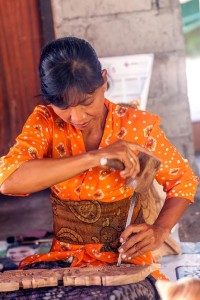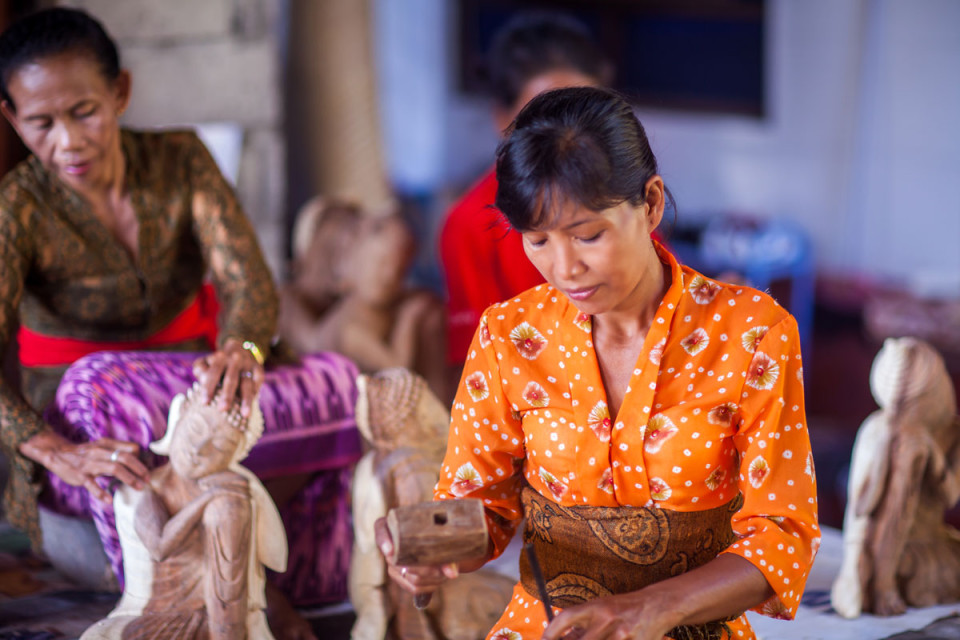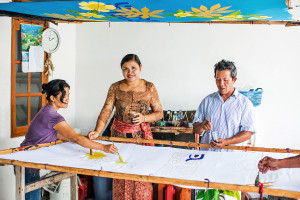NOVICA Artisan Seji Taram on Resilience, Keeping Traditions Alive, and Hopes for the Future
A few decades ago, the inventors of the internet envisioned their wondrous creation helping to build a “global village.” In 2015, nowhere has this (seemingly) outlandish, utopian, community-spirited dream been more realized that at NOVICA, the Santa Monica-based venture that, in partnership with National Geographic, now provides an online marketplace for artisans around the world.
Here, craftspeople from far-flung settings, including Africa, Central America, and Indonesia, can keep their livelihoods and century-old traditions alive, by expanding their customer base immeasurably and selling their wares — often reflective of painstaking artistic expertise — thru NOVICA’s website. (Click here for more details about how all of this works.)
In this second installment of interviews with talented female artisans who offer their goods to NOVICA’s clientele, the imagery of the “global village” again springs to mind, because Seji Taram – a Balinese wood-carver whose picture on NOVICA’s website radiates a glowing serenity, with hints of pride at her family nearby – voices the same kinds of emotions about losing a spouse and having to start over as, say, a homemaker in Memphis might.
The old idea we have heard countless times — that we are all kindred humans, and all the same underneath — is very much borne out in her interview. She talks about her hopes of passing on her artistic knowledge to others, resilience, saying goodbye to her beloved partner, and learning how to manage a business. And for readers who simply want to feast their eyes on intricate, hand-carved sculptures in lovely, caramel-colored wood, showing meticulous workmanship, they can have a look at her wares that she, like many at NOVICA, can now offer to the world.
 Name: Ni Ketut Seji (Seji Taram)
Name: Ni Ketut Seji (Seji Taram)
Title: Wood-carving artisan
Company: Taram Family Carver
Location: Batuyang, Gianyar, Bali
Age: 45
Favorite Quote: My children are everything to me; and my Spirit of Life shall always be strong.
Family: Single parent, with two children (20 years old, and 8 years old)
Can you tell the readers a little bit about yourself?
I am single parent with two children; my husband passed away last year from cancer. When my husband was still with us, we worked together — he was a woodcarver specializing in dragon statues, and I specialize in Buddha statues.
Now that my husband is gone, I still continue the work. I am working now with two male and two female carvers who help me to do finishing elements for the sculptures. They are learning the traditional wood carving skills in this way. My work is to carve the statues, to make them proportional and correctly shaped.
Right after my husband passed away, I doubted that I could continue, but I had a lot of support from my family, my children, friends and NOVICA, so I kept going. And now I have proved to myself that I can do it — I don’t have any worry anymore about my business.
How did you get into your current business?
Wood carving is our family tradition: when I got married to my husband, he taught me how to carve. He had learned how to carve when he was a child, since it was passed down through generations of his family.
When we carved together, my husband did the main shape of the sculpture, and then I would do the smaller carving to give the details. For instance, with the dragons that my husband made, I shaped all the details for the dragon’s scales, wings and final finishing. I have been doing this kind of work for more than twelve years now.
What inspires your work?
My husband is my inspiration. I will always remember him — he was so kind and gentle, he loved and cared for me and our children so much. He was very sweet to me, and always tried to make our family happy. I keep this memory of him and, with my carving, I want to continue the work that he loved so much.
Do you have any mentors or heroes who inspire you?
The mentor and hero who inspired me was my late husband — he is my hero!
How does your culture/background influence your work?
Balinese culture influences my work. I live in the village where many people used to work in wood carving – but now there are fewer artisans, because many of them have changed professions to work in the construction filed or become restaurant workers.
But of those that are left – when the artisans in my village make a new creation, it also inspires me, and moves me to make new designs. It’s such a traditional part of village life here — and I find it a great place to work!
What has been your biggest challenge so far with your business?
To find good artisans with carving skills; the quality of the work now is not as good as it was many years ago. The tradition is simply not being passed down in families like it used to be. Many years ago, the carvers did very fine, detailed work.
I understand why there’s been a change; it’s hard, each piece takes a long time, and it takes many years to learn the skill and feel of the wood. Now people prefer to do the simple, more abstract designs thath are easier and faster to make. But for me, I still prefer the traditional style, and will continue to create this way. It’s difficult, though, to find artisans now that have the same quality as previous generations.
What has been your greatest accomplishment?
I feel I am doing great with my business with NOVICA! I can provide a living for my family. I feel I have more spirit to give to my work because I overcame my fear, especially after my husband’s death. I work hard for my business, and I am proud of my achievement. I hope I can improve more, and my business can continue to grow.
Was being female either an advantage or disadvantage your business?
I think being female and a single parent now in my business has given me a little advantage – in the sense that my team works with more energy and passion than when they worked with my husband, because they see my drive, my passion and my love for continuing the business. My production has increased.
What do you think is the biggest issue for women in the workplace?
For Balinese women, the biggest issue is balancing our religious life with our business life. There are many ceremonies here, and women have a lot of responsibility in preparing for these ceremonies, usually having to miss work in order to prepare and participate. Balinese women cannot miss out on their duties for the Balinese ceremonies so — business comes second!
What advice would you give to young women starting a business?
We, as women, should be always strong and independent, so if anything happens we can keep going. Never give up, always keep a positive outlook. It’s not easy to keep the balance between work and family life, but it can be done.
Advice you wish you’d had (or had followed) when you started?
So far I feel I got the best advice when my husband passed away: at that time, I was down, scared and worried that I could not provide for my family, that I could not send my children to school. The advice to keep going, and all the support during those months, really helped me to stand on my feet. It showed me that others believed in me — so I should believe in myself.
What’s the most important business lesson you’ve learned?
I am learning it now, by learning to do this business on my own. I’m learning to manage people, time, production, and supplies. The best way to learn is just to do it — make mistakes, but grow from those mistakes.
What does success mean for you?
The meaning of success for me is when I can provide a good living for my family, and I can send my children to school. That makes me feel that I am successful, and makes me happy and proud.
What are your hopes for your business in the next 3-5 years?
I hope that I can find more good carvers who can help me to grow my production, so we can sell more. With that scenario, I can help and support more carvers so they don’t leave this traditional art. I want to give some kind of benefits to my staff, too, because they also help me to grow.
And lastly, I hope that in five years, my business can expand enough so I can buy a small house for me and my children, and have a workshop there where we can live and work peacefully.
Will your children take over your business?
Yes, my youngest child said he wants to learn to carve someday and continue the business. I’m very happy to know the tradition will continue in our family as long as possible!
Anything else you’d like to add/share?
I feel blessed.
TAGS: NOVICA
 Effective Communication
Effective Communication Women Making History
Women Making History Grants & Funding Sources
Grants & Funding Sources Interview Prep
Interview Prep Impactful Leadership
Impactful Leadership Dressing for Work
Dressing for Work Dressing for Your Style
Dressing for Your Style Interview Style Tips
Interview Style Tips Women's Stocking Stuffers
Women's Stocking Stuffers Gift the Busy Traveler
Gift the Busy Traveler Airport Layover Activities
Airport Layover Activities Traveling & Eating Healthy
Traveling & Eating Healthy Travel Like a Boss Lady
Travel Like a Boss Lady The Dual California Life
The Dual California Life Gifts for Thanksgiving
Gifts for Thanksgiving Summer Reading List
Summer Reading List Top Leisurely Reads
Top Leisurely Reads New Year, New Books
New Year, New Books Life Lessons from a Sitcom
Life Lessons from a Sitcom Oprah, Amy or Amal?
Oprah, Amy or Amal?







